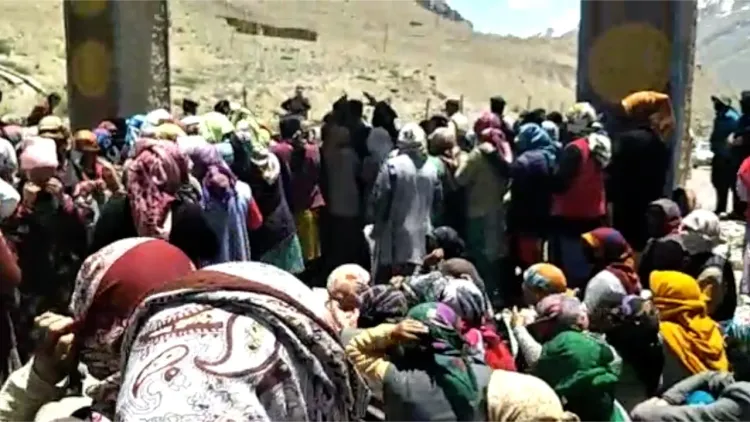International Women's Day: The Struggle of Tribal Women in Himachal for Ancestral Property Rights

Synopsis
Key Takeaways
- Wajib-ul-Urj law enforces gender inequality in inheritance.
- The Hindu Succession Act provides equal rights, but local customs persist.
- Women activists are leading protests for change.
- The Supreme Court supports tribal women's inheritance rights.
- Political silence hinders progress in women's rights.
Shimla, March 7 (NationPress) Wajib-ul-Urj, a traditional law among tribal communities, perpetuates inequality within the tightly knit society of Himachal Pradesh's remote mountainous areas. This practice continues despite the Supreme Court's repeated affirmations that daughters should enjoy the same rights as sons, including equal coparcenary rights to inherit their father's property.
The long-standing statutory provision of Wajib-ul-Urj has persisted for nearly a century, disregarding the amendments made in the Hindu Succession Act of 1956, which guarantees equal inheritance rights for both men and women.
Consequently, women—including unmarried, widowed, and divorced individuals—are denied the right to inherit their father’s or husband’s property unless it is explicitly bequeathed.
This customary law originated in the Kinnaur and Lahaul-Spiti districts, and in some areas of Chamba district, notorious for polyandry due to limited land and resources.
As a result, several brothers often marry a single woman to prevent land division.
For over a decade, this discriminatory law has sparked numerous protests at the grassroots level and ignited various legal disputes.
Rattan Manjri, a prominent figure, has been leading panchayat meetings and signature drives to challenge this law.
Older community members recall that this law was established to protect scarce, fertile land at high altitudes, which is primarily used for single crop cultivation or monoculture.
The law is rooted in the belief that granting inheritance rights to women would allow outsiders to acquire land if they marry outside their community.
Local women activists, preferring to remain anonymous, implore the Indian government, especially President Murmu—India’s first tribal and second female President—on International Women’s Day to address the challenges faced by tribal women who are barred from inheriting property due to local customs.
This plea comes despite the Supreme Court’s decision in December upholding tribal women’s inheritance rights and suggesting potential amendments to the Hindu Succession Act.
The apex court was reviewing an appeal that contested a 2019 ruling by the Chhattisgarh High Court, which denied a request from members of the Sawara tribe seeking governance under Hindu law regarding inheritance issues.
“Providing inheritance rights in Himachal Pradesh will aid women suffering from social injustice and exploitation,” stated a woman social activist based in Shimla during an interview with IANS.
She mentioned that the number of widows and unmarried orphans is on the rise in Kinnaur and Lahaul-Spiti due to the restrictive customary law.
Often, male family members mistreat their unmarried sisters and sisters-in-law following the death of their parents or spouses.
Interestingly, the Spiti region of Lahaul-Spiti has a primogeniture law, where succession rights are granted to the first-born child, akin to feudal rules that transfer the entire estate to the eldest son, leaving other male siblings without legal property rights.
In cases where there is no heir, inheritance is passed to male relatives in order of seniority.
Bhawna Negi, a newlywed IT professional from Kalpa in Kinnaur, now residing in Chandigarh, shared with IANS, “Although local men who live within a family support the movement to abolish this discriminatory law, politicians remain silent. Perhaps they are prioritizing vote bank politics over upsetting the men who benefit from this law.”
A Himachal Pradesh High Court ruling in June 2015 granted land inheritance rights to tribal women, although this was subsequently challenged.
“Daughters in tribal regions shall inherit property according to the Hindu Succession Act of 1956, not customs, to protect women from social injustice and exploitation,” declared Justice Rajiv Sharma of the High Court.
He reinforced a 2002 order from the District Judge of Chamba to grant legal property rights to women.
Justice Sharma, in a comprehensive 60-page judgment, remarked: “Tribal regions have modernized over time. Their culture may differ, but customs must align with constitutional principles. Laws must evolve with time for societal progress.”
Manjari, a 73-year-old activist and educated apple grower from Ribba village, approximately 250 km from Shimla, chose not to marry. She insisted, “If a woman marries outside her community, she must relinquish her rights to ancestral property. Yet, this discrimination must come to an end.”
Manjari, the daughter of military veteran Colonel P.N. Negi, who served in the British Indian Army, is among the few women in the district to inherit agricultural land from her mother, who chose her over her three brothers.
She recounted how her fight for justice for women began at age 22 when she was elected village pradhan (head). She was also the first woman from Kinnaur to run for an Assembly seat but faced defeat due to the patriarchal structure of society.
Nevertheless, her ambitions extend beyond the Himalayan peaks, aiming to eradicate male dominance.
(Vishal Gulati can be reached at vishal.g@ians.in)









